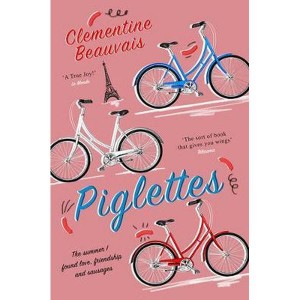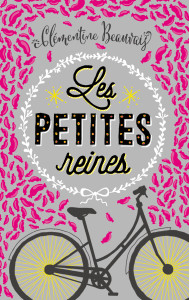This post previously appeared on the Awfully Big Blog Adventure website.
I’m currently translating Meg Rosoff’s uncategorisable little gem Moose Baby into French.
For those of you who haven’t read this delightful tiny novel, it’s the story of a teenage couple who give birth to a baby moose. Lucas Imogen Rudolph, or Moosie as he is affectionately known, is a charming little fur ball but also relatively maladjusted to the world around; at the age of eight months he already weighs one hundred kilos and not much of the furniture survives his toddlerish antics. It is not just funny but also clever, with biting satire of middle-class parenting, deft commentary on special education and on the world’s perception of teenage parents, and also extremely moving at times. A perfect little novel, really, somewhere between Kafka and Louise Rennison (I know, not names you often see together in the same sentence).
Anyway, this novel is tricky to translate in part because you laugh so much the whole time, but also because of a central difficulty at its core. This is a moose:

In French, it’s called un élan, or un orignal.
Moose is a funny word in English, which is lucky because the animal is also, well, fairly ridiculous-looking (sorry, moose fans). Unfortunately, in French, élan and orignal are not funny words. They are perfectly bland and boring. Worse, élan also means an impulse or build-up and it’s most often used in that sense, so there’s some potentially problematic semantic confusion there.
For Moose Baby to work in French, I had to turn Moosie into another animal:

Those of you who know their cervidae will have spotted straightaway that this is a reindeer, like Rudolph (and Olive, the other reindeer), and not a moose, which is bigger.
Reindeer, alas, look less ridiculous than moose (sorry again, moose fans). However, what comical potential it loses in appearance it makes for in denomination, because switching species meant I could use the word Caribou, which is astronomically funnier than élan or orignal. The word Caribou is so weird that it somehow conjures up a more grotesque creature than the word élan, which sounds loftier and more serious. Caribou is clearly clunky and clownish, while élan ambles gracefully, towering above the steppes.
Of course, this wouldn’t happen if this was about, say, a film adaptation. Visually, a moose would be more impressive and funnier. But in a novel, you need to pay close attention to the shape and sound of words – sometimes even more so than to what they refer to in the world.
So in the French novel, Moosie the Moose becomes Boubou le Caribou. It will require some adjustments regarding size and weight indications, but it will, I think, be faithful to the comical power of the source text.
When we’re translating, of course, we’re constantly confronted to those strategies of compensation. Sometimes a pun just won’t translate, so you delete it there and add another one, that didn’t exist in the source text, somewhere else.
But sometimes, like here, it’s a more radical move than just microscopic compensations. It’s happened to me several times to have to make such a move. Stylistically, for instance: I wrote elsewhere about translating Sarah Crossan’s One, which required thinking strategically about where to locate ‘the poetic’ in that verse novel, which led me to opt for a much more rhyme-heavy French version.

I’ve also written about my own self-translation of Les petites reines into Piglettes, which required entirely changing the central pun (‘boudin’, black pudding, a funny word for ‘ugly girl’, didn’t work in English) and therefore adjusting a lot of the story.

Moose Baby is therefore just another one of those choices, but it still makes you bite your nails in anguish. What if the baby actually needs to be, fundamentally, a moose ? What if, as a caribou, it just loses all power?
In my case, I could just message Meg Rosoff to ask if it’s OK (and in fact I have done so), but the problem is that, notwithstanding the fact that she is, of course, a pretty exceptional person, she’s not better placed than anyone else to judge, just like I’m not a good person to judge whether ‘black pudding’ should become, in the translation of my Petites reines, sausages (as in the German version) or paté (as in the Polish version). Even after 11 years of living in Britain I had trouble figuring out how to translate it into English myself. Probing authorial intention in the case of translation is a dangerous game.
Translation choices are endlessly puzzling to writers, but I think it’s important to trust that the other country does in fact, most of the time, know best. I was a bit taken aback when it was suggested that my Songe a la douceur (an untranslatable par excellence, since it’s a line of poetry by Baudelaire) be translated into English as In Paris With You.
 |
| proofs! |
To a French person, even one strongly Britannicised like me, there’s nothing particularly romantic about being ‘in Paris with you’; I’m often ‘in Paris with’ random people, and it generally doesn’t mean I spend my time eating croissants with them, gazing into their eyes and listening to an accordion piece while the Eiffel Tower sparkles in the background. But when I started hearing the enthusiastic reactions of my British acquaintances to this title, I understood that I had, in fact, clearly no legitimacy whatsoever to assess the power of that title.
I had a similar conversation with Sarah Crossan regarding the title of her Weight of Water, which I also translated into French. After many weeks of painful brainstorming, my editor came up with the perfect title for our French version: Swimming Pool. Now, I can’t quite explain to you why it’s the perfect title, but it just is. Swimming Pool. It’s mysterious, it’s attractive, it’s sexy, it’s melancholy, it’s blue-green and it’s perfect. End of story.
Sarah, however, was a little underwhelmed, because of course ‘Swimming Pool’ in English is a banal word that evokes not much more than rubbery swimming caps, eyes red from goggles, and the smell of chlorine. But see, that is what French people think, too, when they hear the word Piscine, while Swimming Pool is endlessly mystical.
I’ll never tire of exploring that ‘can’t quite explain why, but trust me, it is the best option’ area of translation. It’s important to talk about it, too, because every time you’re reading in translation you’re doing a kind of leap of faith and you need to understand that it’s OK. Better than OK: wonderful. You have to trust the translator and their editor because they’re the one in charge and chances are, they know better than – well, than you, for a start, and also than the author, doubtlessly – how to carry that story across to you.
So it’s caribous and swimming-pools, not élans and poids de l’eau.
Just because.
Trust me.



